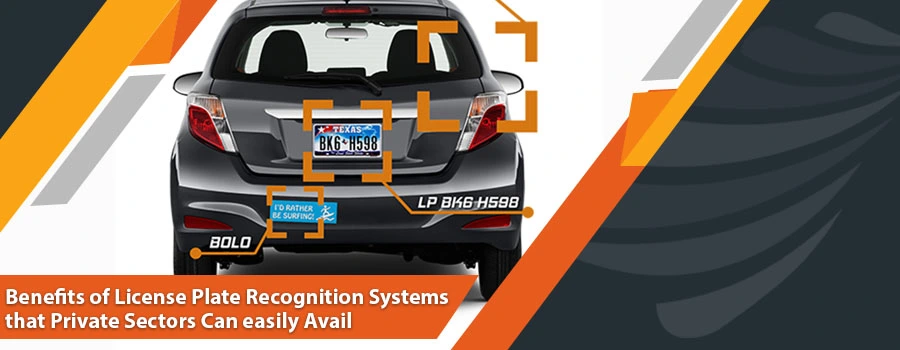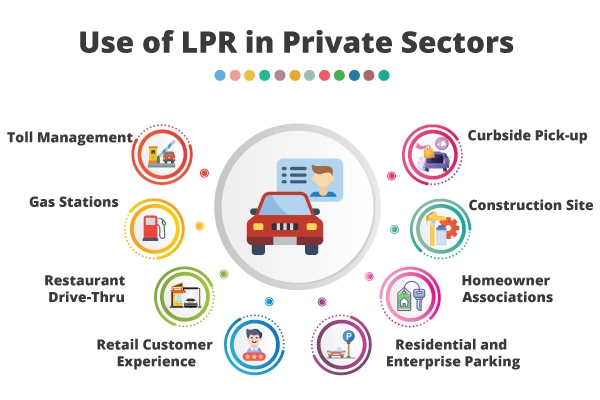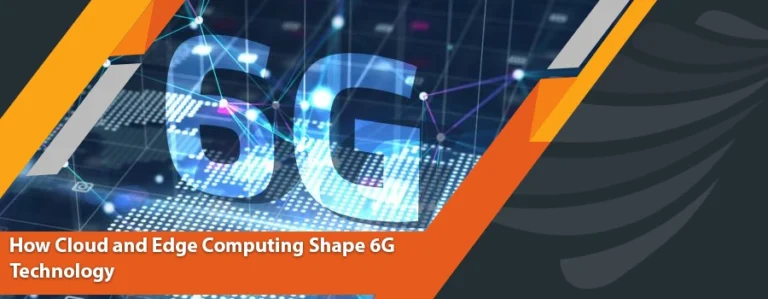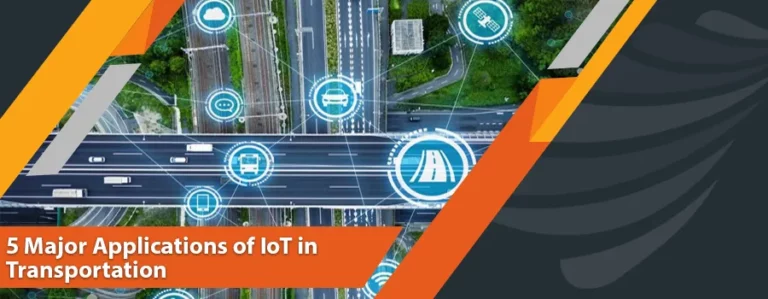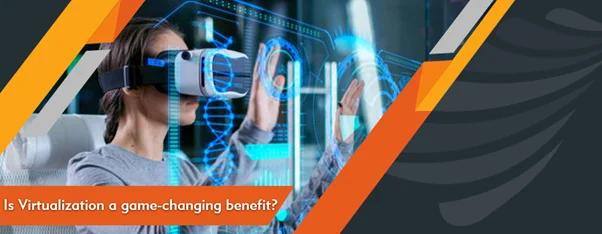Law enforcement authorities and homeland security are the two major segments in which the License Plate Recognition (LPR) or Automatic License Plate Recognition (ALPR) is used widely. However, the private sector can also utilize LPR’s incomparable security benefits. LPR is not only for cops or government sectors. This highly advanced technology is also a perfect fit for the private sector regarding security and improving customer experience. Not every private business can use such automated systems. However, a few sectors in the town still might be overlooking the usefulness of LPR and how it can add value to their business only if integrated effectively.
Those unfamiliar with this advanced technology may picture it as a costly and complex system used to scan license plates of numerous vehicles, but this is not the case every time. A simplified method can be created by connecting the specialized recognition software with the existing surveillance in the private sector. LPR in the private sector can make things much more productive and reduce manual work. The following article enlightens some of the use cases of LPR in the private sector. However, before going deep into the discussion, some basic functionalities of LPR are discussed.
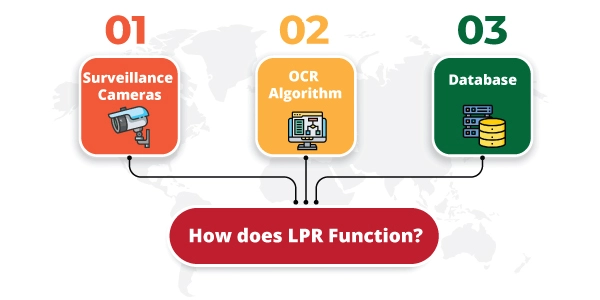
How does LPR Function?
LPR uses Optical Character Recognition (OCR) for reading license plates, and an algorithm matches the collected data with the given database. The system combines the following components to work smoothly. Conure’s LPR system “OLIOS” also works on the same principles.
Surveillance Cameras
Through cameras, the vehicle’s image is captured to focus on the license plate. These cameras can capture a clear image even at high speed or at nighttime, providing enough details for vehicle identification.
OCR Algorithm
This algorithm is used to parse out the license plate from the captured image to issue important characters and entities. Despite the complexity, the process only takes seconds to transform the image into alphanumeric characters while utilizing big data and AI techniques.
Database
The LPR system determines the match between the collected data and available records. For this purpose, the government can use its vehicle records. However, private companies are required to use their in-house databases and systems.
One thing that is mainly understood by the private sector is that the LPR requires specialized cameras. However, this is not true as the system is flexible enough to be integrated with the existing surveillance system and video analysis software. This ultimately makes LPR cost-effective and user-friendly as well.
Use of LPR in Private Sectors
Toll Management
In recent times, toll management has become entirely dependent on the LPR systems for more intelligent traffic control. LPR system eliminates the need for barriers and staffed booths for tolls. The system monitors the traffic and ensures that the tolls are collected efficiently. To cater to road monitoring challenges and provide a free flow, LPR is viable for private toll management.
Gas Stations
Another essential private use of LPR is to prevent drive-offs at the gas stations, ultimately minimizing gas theft and saving personal resources from exploitation. The detected license plate can be used for further investigation in case of crime or fiasco. Furthermore, after detecting the vehicle’s license plate at the gas station, the system can store it in the database for further analysis to determine how frequently a particular vehicle visits the gas station. This meaningful insight can help the owners in enhancing customer satisfaction.
Restaurant Drive-Thru
Even a 10 seconds delay in the restaurant drive-thru can result in a 1% loss to the company. However, with the help of the LPR solution, restaurants can improve queue abandonment, customer order value, turnaround time, restaurant labor, and food cost metrics. For instance, menu boards can be personalized based on the specific vehicle’s order history, usually visiting the restaurant. This ultimately enhances the order process. The data of the customers’ license plates are sent to the internal food preparation system to prepare the food item that is most likely to be ordered by the owner of the specific vehicle. This intelligent system reduces ingredient waste and turnaround time.
Retail Customer Experience
The ability of the retailers to recognize the vehicle of the customers allows them to enhance the customer services, which in turn also increases customer satisfaction. This also holds the potential to improve employee productivity and same-store sales. Apart from improving the customer experience in retail, LPR can be used to prevent organized retail crimes. LPR stores the vehicle’s license plate in the databases, acting as an investigative and robust analytical tool for crime prevention. From generating leads on the suspect vehicle to alerting the authorities when the suspected vehicle is identified, LPR is indeed an effective tool for loss prevention investigation. LPR also makes the premises secure for regular customers.
Curbside Pick-up
LPR can efficiently streamline the curbside pickup and reduce customer waiting time. The LPR system for curbside pickup works in two steps. In the first step, the customers must insert their vehicle license plate with the order. The license plate is saved in the database along with the customer’s order. In the second step, when the customer arrives at the store, the LPR camera scans the plate and sends a notification to the retailer about the customer’s arrival in real-time. In this way, retailers can greet the customers with a customized voice message or digital signage and update the customer about the order.
Construction Site
Construction sites have a dynamic and busy environment. However, the key to completing the project on time is to have greater control. With LPR, construction managers can track the vehicles efficiently, limit site access, improve job security, and control the asset’s movement on site. Additionally, LPR cameras at the construction site can enhance the security of the premises. The majority of the construction sites are poorly lit and become dark at night. The standard definition security cameras at the site cannot provide helpful evidence in case of any crime. LPR captures license plates without any limitations and helps track down unauthorized vehicles and visitors on the site.
Homeowners Associations
The LPR system has incomparable value for helping law enforcement agencies investigate crimes. For instance, illegal dumping and accidents. LPR allows the homeowner association to gather crime evidence and pass this information to the law enforcement agencies. By deploying the LPR camera in the neighborhood, homeowners can significantly benefit from its features. They can track the cars leaving and entering the streets at any time.
Residential and Enterprise Parking
Private entities such as residential areas and corporate can use the LPR system to ensure safety in their parking lots. The system can work with employee credentials and building access control. LPR allows private entities to have greater control over managing the parking. In this way, the private entities have the data about the person or employee who is allowed to enter the parking lot. LPR in such premises can also limit the issues of hit and run or vandalism.
Conclusion
The above discussion proves that LPR has a wide range of uses for both public and private sectors, and its benefits are not limited to homeland security and law enforcement. Many private industries can use LPR to prosecute and deter crimes, secure the site’s premises, or improve customer experience. Overall, LPR reduces the burden of manually authorizing the vehicles and collecting evidence against the car involved in the crime.

